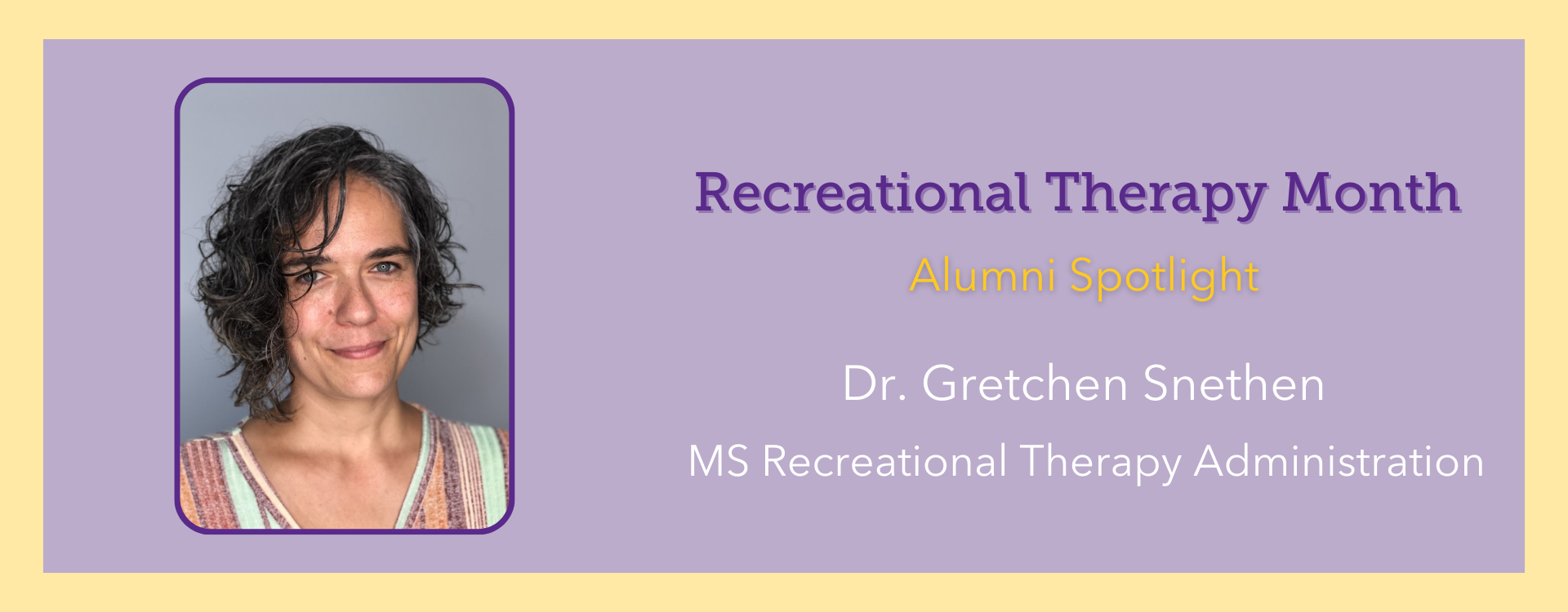Recreational Therapy Alumni Feature: Gretchen
Name: Dr. Gretchen Snethen
Graduation Year: MS Recreational Therapy, class of 2007
How did you become interested in this field?Like many, recreational therapy was a discovery for me! I graduated with an bachelor’sdegree in English. I wasn’t sure what I wanted to do. In college, I was president of our rock-climbing club and ran the outdoor pursuits program for the campus recreation center. During the summers, I was the ropes course and climbing director for our local Boy Scout camp. My dream job at the time would have been working with youth at risk in an outdoor environment. I found a few jobs that looked interesting and they required a degree in recreational therapy. Having no idea what that was, I Googled it! By some stroke of luck (or fate!) the ATRA annual conference was a few weeks away in Kansas City, MO. It wasn’t far from my aunt’s house, so I went to stay with her and went to the conference for a day. I met with ECU’s very own Dr. Loy, learned about RT, and set my future in motion!
What were some of your favorite recreational therapy courses at ECU?Oh gosh! It’s been so long!! I enjoyed the graduate RT programming class with Dr. Skalko. We partnered with the undergraduate students to develop an RT program. I also enjoyed the graduate Assessment and Documentation course. We developed our own assessment tool and my group trolled Dr. Loy with our development of the Pediatric Hospital Assessment for RT or PHART.
Describe your job/role/current employer?
I am an associate professor at Temple University and also the Associate Director for the Temple University Collaborative on Community Inclusion of Individuals with Psychiatric Disabilities (http://www.tucollaborative.org/). We are a research and training center that conducts state of the art research to promote participation in the community of individuals with serious mental illnesses. We also provide training and support for mental health professionals to shift services to promote community participation. Ultimately, we believe community participation is a medical necessity and that people with serious mental illnesses should have the opportunities to participate in their communities, just like everyone else.
What is a typical day like for you?
I work on grant funded projects, so my work looks a little different than a front-linerecreational therapist. But! I get to develop and test interventions. We have projects that focus on supporting parents with mental illnesses to engage in leisure and recreation with their kids; a distance-based intervention for emerging adults to increase participation in community-based recreation; and a transportation project that supports individuals to use public transportation and the bike share system in order to increase independent transportation. My day-to-day work is connecting with mental health agencies, developing research manuscripts, and developing training resources, many of which are used by recreational therapists.
What has been your favorite experience working in recreational therapy so far?I was directly involved with a few pilot projects that supported individuals with mental illnesses to ride bikes in the city. To me, bikes represent freedom and independence. We rode through the city together. Participants were laughing, singing, and ringing the bike bells. It was joy on two wheels.
Where do you see the future of recreational therapy headed?
Recreational therapy has the potential to truly make an impact in the community. I would love to see recreational therapists working more intentionally in health promotion and disease prevention, particularly with individuals in transition– transitional times like graduating high school, having kids, retiring, etc… All of these are great opportunities for recreational therapists to support people to engage in health promoting activities that may endure throughout the transition!
What is the greatest challenge recreational therapists face?The face of healthcare in the United States is ever changing. More and more professions are embracing the types of interventions we do. We need to be bold and own our scope of practice. We need to be diligent with demonstrating the evidence of recreational therapy. We need to be loud and demand a seat at the table.
What advice would you give to students who wish to enter this field?
Learning doesn’t stop when you graduate! When you’re passionate about what you do, it shows, and learning can be fun! Look for opportunities to grow your expertise. Don’t be afraid of research! The research process is really about systematically documenting the work you are already doing. Share the impact you are having with your colleagues, your supervisors, and with the rest of the field!
This year’s theme for recreational therapy month is “finding your place.” Can you share your experience(s) that helped you find your place within the field or certain area (or population) of RT?
I love my work for a number of different reasons. First, my focus in community mental health means I get to work with people in their communities. The work I do aims to support people to access everyday resources and engage in the activities they find meaningful. This is how to promote sustainable change! I think I found my place here because of how much being in my own community means to me. I love biking, going to local parks, exploring new neighborhoods, etc… Communities provide a wealth of opportunities to increase engagement in recreation and promote health. I want to help empower others to access these resources, because they are intended for everyone!
